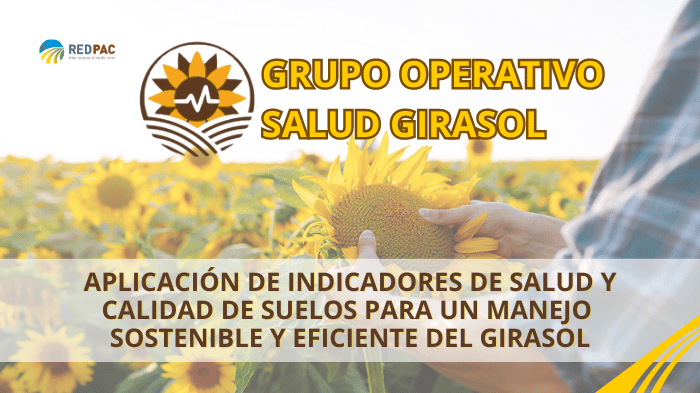
31 de May de 2024
Innovación
Cambio climático y gestión de recursos naturales
The goal is to implement soil quality and health indicators and develop a practical guide for sustainable cultivation.
- The Sunflower Health Operational Group "Application of Soil Health and Quality Indicators for Sustainable and Efficient Sunflower Management" works to create crops that are more resilient and prepared for possible crises.
- Two resources will help you achieve your goals: key soil indicators and a sunflower cultivation sustainability guide.
- The project focuses on Aragon, Castile and Leon, Castile-La Mancha and Andalusia
In a global context of increasing shortages of oilseed and protein crops , innovation in agricultural tools becomes crucial to improving the quality, efficiency, and sustainability of production. Sunflower cultivation is essential in regions such as Aragón, Castilla y León, Castilla-La Mancha, and Andalusia, where a system of soil health and quality indicators would be desirable.
Thanks to the creation of the Sunflower Health Operational Group (GO) at the beginning of 2023, an innovative project focused on these autonomous communities has been created. The project aims to enable farmers to make informed decisions about fertilization and sustainable management, optimizing resources and promoting responsible agricultural practices that ensure the modernization and sustainability of the crop in Spain.
Goals
With the experience and knowledge of its members, the Group has identified three needs from which to base its activities:
- Need 1: Improve crop profitability . This stems from availability issues stemming from the ongoing conflict in Ukraine, which was previously a major supplier of sunflowers.
- Need 2: Increase the resilience of Spain's agri-food and agricultural sector. The emergence of annual economic, climate, and supply crises has sparked the need to develop models that design action strategies and more resilient cultivation methods. Thus, the project aims to provide tools that improve the profitability, productivity, and sustainability of sunflower cultivation.
- Need 3: Improve sunflower sustainability and maintain soil quality and health. In addition, we want to provide other ecosystem services that support the crop.
Based on the diagnosis of these needs, the GO aims to provide two innovative results in the sunflower subsector:
- Application of soil quality and health indicators : This will enable sustainable and efficient sunflower management. The goal is to find a way to determine soil age in a reliable, simple, and cost-effective way for any farmer.
This means having more tools to make fertilization decisions.
- Development of a practical guide for crop sustainability .
Expected results and actions
The project's results will focus on seeds , seeds , and oilseeds , potentially increasing sunflower production by 700,000 tons . Furthermore, the estimated increase in production value would exceed 25%, resulting in more than 25,000 direct beneficiaries who would receive more than €140 million annually.
Furthermore, innovations also contribute to mitigating negative effects and adapting to climate change . This is due, as stated by the GO website, to "the improvement in soil quality and health through the measurement and interpretation of indicator parameters," which "positively impacts environmental protection [and] improves the soil's carbon sequestration capacity."
To date, the GO has selected 23 plots where soil samples have been collected for physical, chemical, and biological analysis, allowing for the study of soil activity. In addition, satellite monitoring of crops has begun to analyze the greenness, health, and density of vegetation in the plots.
Future analysis will be completed with leaf samples of open flowers and seed collection, already carried out by professionals.
Partners and financing
The Sunflower Health Operational Group is made up of the Young Farmers Association ( Asaja ), Fertinagro Biotech , and the Segura Center for Soil Science and Applied Biology ( CEBAS-CSIC ). It also includes the "Agroecosystem Contamination by Agricultural Practices" group from the Polytechnic University of Madrid ( UPM ) as a subcontracted member.
The project has an investment of 461,227.84 euros, 100% financed by the European Union through the European Agricultural Fund for Rural Development ( EAFRD ).









